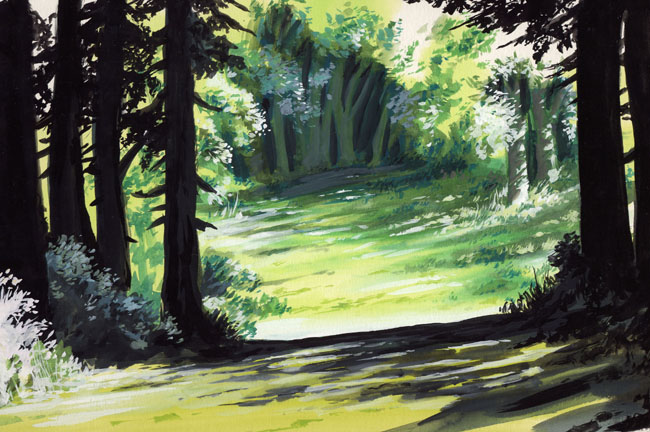Before the Night of Fiery Skies, the Prill were singers of the mysteries of the universe. Under the tutelage of the Dusk Sages they harmonized and categorized in musical notes the primordial sounds of creation. Their potential was extraordinary. Their music could literally move mountains. One day, they might have been able to compose melodies of planetary impact. That opportunity never arrived, however. What came instead were the Cheldrun.
The arrival of the Cheldrun was a mixed event for the Prill. On the one hand they are not without their curiosity, and it is possible that the children of Steel bring lore of value. However, this small good is far outweighed by the traumatic departure of the Dusk Sages and the industrial onslaught of the Cheldrun against the forest. For years after the departure of the Dusk Sages, the Prill stood in shock doing nothing, but the impending annihilation of the Vorax among other things jogged them back into action.
They assembled the massed choirs and in an historic move vowed, as a people never to use their customary animal form, a fox, until the danger to the forest was averted. Since then the choirs sent emissaries all across the continent to the other Karians seeking solutions to the war with the Cheldrun. Some are using guerrilla tactics. Some advocate total war. Some advocate peace accords, or concessions. All of them are using whatever power they have to attempt to stem the tide of Cheldrun expansion.
These emissaries have had only limited success, not only because the Karian peoples are so disparate, but because the Prill themselves are so distinctive in their mindset. Like the Vorax, the Zipsum and the Anakarix, the Prill consider themselves lore keepers, but of a different type. Whereas a Vorax or a Zipsum could tell you about foreign locations and people, an Anakarix could tell you about the nature of life and the universe – Prill lore revolves around the Dusk Sages. Of all the races the Prill have the most lore about the Dusk Sages, but they haven’t managed to incorporate it deeply into their own culture because it is so different. They study it like studying an ancient civilization or like studying angelology. The wise know they’re missing something, but they don’t know what.
What’s more they record all their knowledge in music. To a Prill songs are sacred, so using them for entertainment is heresy for a Prill. Their culture is complex and they have many superstitions and unspoken taboos which they teach through song – but they take a long time to learn, so newcomers are always offending the Prill and not knowing why, or bringing bad luck on themselves accidentally and being shunned. Those Prill who interact more with other cultures learn tolerance around these areas, slowly. Many of these more tolerant Prill also find a stirring love of instrumental music (which the Prill don’t have in their own culture). It edges toward heresy to enjoy it so, but it isn’t technically singing, so they think it’s okay.
Prill have human length lifespans. Culturally they make no distinction between males and females. Children are raised by the choir of descent. During adolescence a young Prill singer will be fostered out to a variety of different choirs until he/she discovers which choir is a most natural fit. After a series of rituals for entering adulthood the Prill is then inducted into the Choir and begins the process of learning the music. Different levels of mastery (called tails) are attainable within each choir, and tails confer status upon the individual singer. Society is highly regimented. Everyone knows their place in the choir and keeps to it.
That is, unless a particularly talented singer is selected to become Guardian of a Song. Each choir has a repertoire of songs that it keeps. They may be sung by the whole choir, but one singer is particularly responsible for the song – and to see that it is passed to the next generation. There is never more than one Guardian per song, in a choir. It is common for Guardians to take apprentices from among the most talented singers in the hopes of finding a suitable heir for Guardianship.
The Prill are mostly a culture of maintenance and tradition, but there is some innovation in them as well. Those who study the lore of the Dusk Sages occasionally make new breakthroughs, and especially gifted singers occasionally compose new songs, which become part of a choir’s repertoire. This is exceedingly rare, however, and it is not greeted with the excitement you might expect. Prill consider the new to be suspect and accept it only begrudgingly, while extolling the value of the old.
***
Players who wish to play a Prill should ask themselves several questions. It is my expectation that Prill player characters would be guardian of a song. Which one are you guardian of? Be very detailed in describing your song, what it sounds like, how it moves you personally and what you can do with it. Then select a choir that would be appropriate for that song. Obviously there will be some overlap, for example both the Choir of the Oceans and the Choir of the Elements have their own versions of the Song of Water. You should spend time detailing your relationship to the choir, standing within it, friends and family in the choir etc… Prill rank status by “tails” the highest ranked Prill in the world for many generations now have been up to 6 tails. How many tails have you earned (for what)? Represent this with Organizational Ties.
Example Names: Aki, Autumn, Faia, Fuzei, Gogyou, Haru, Hazumi, Inari, Kasai, Kinzoku, Koudo, Kyuuka, Mizu, Mokuzai, Spring, Summer, Tei, Tsuchi, Uxinta, Winter
Example Attributes: Aura of Inspiration, Block Power, Companion, Energy Bonus, Features (appearance, perfect pitch), Heightened Awareness, Heightened Senses, Organizational Ties (choir), Power Flux
Example Skills: Acrobatics, Administration, Animal Training, Artisan, Cultural Arts, Domestic Arts, Etiquette, Occult, Performing Arts, Stealth, Visual Arts, Wilderness Survival
| Prill attitudes towards…. | |
| Cheldrun | Alas, the children of steel are misguided and deaf to the discordant nature of the song they are singing. |
| Allskins | We share a respect for tradition with these people, but they have no sense of how their tradition is corrupt and doomed to end in catastrophe. |
| Biomade | These perpetual innovators are like fruit flies – in two or three generations they’ve lost all sense of who they were. |
| Mechified | We lament the cruel joke that has been played on these monsters. However, the destruction they wreak on the forest cannot be tolerated. |
| Karians | Weep children of mana! Weep! For we are the guardians of this land and under our watch it is wasting away. |
| Anakarix | Wisdom is in these tree-dwellers, though not the courage to use it. |
| Gogajin | Courage, however, the Gogajin have in plenty, but the only song they sing is folly. |
| Jevumm | The opened mouth of a Jevumm sings only of hunger and self-interest. |
| Prill | We are the oath-keepers. We will not avail ourselves of our animal-form until the forest is safe. We are never at home. We are never at rest. We have condemned ourselves to estrangement from ourselves until the threat is ended. |
| Vorax | The saddest song that can be heard in Karia is the cry of the Vorax. |
| Zipsum | These singers are perpetually captivated by the next song they hear. Their heart is good, but we must deal with them like children or they quickly lose interest. |








No comments:
Post a Comment